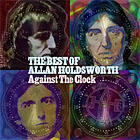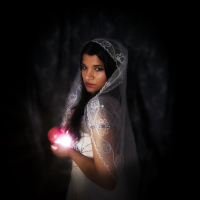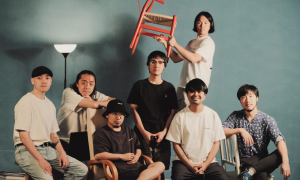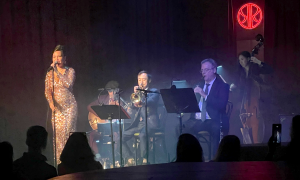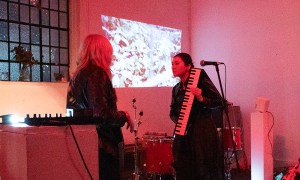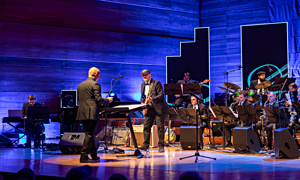Home » Jazz Articles » Live Review » Tel Aviv Jazz Festival 2005
Tel Aviv Jazz Festival 2005
 Some concerts are a once in a lifetime experience. Such an experience was the Roy Campbell Pyramid Trio, featuring William Parker on bass and Hamid Drake on drums, performing on the last day of the Festival in the Tel Aviv Cinematheque. Jazz in its highest form, charged with energy, intense and free, committed and compassionate, and always delivering a humane message. Needless to say, such mind-altering experiences are very rare here in Israel.
Some concerts are a once in a lifetime experience. Such an experience was the Roy Campbell Pyramid Trio, featuring William Parker on bass and Hamid Drake on drums, performing on the last day of the Festival in the Tel Aviv Cinematheque. Jazz in its highest form, charged with energy, intense and free, committed and compassionate, and always delivering a humane message. Needless to say, such mind-altering experiences are very rare here in Israel. The February 26 concert began with a memorial improvisatory piece, after a moment of silence, commemorating the victims of the tsunami and last night's suicide terror attack in Tel Aviv, just a few blocks from the musicians' hotel, that caused the death of five innocent Israelis. "We are all human beings and are connected by the same red blood," said Campbell and the trio began playing a ceremonial elegiac piece, with Parker leading on the bass shaukahachi flute and later the kalimba, Drake hand-drumming on his kit and Campbell playing with bells.
The Trio played mostly tracks from its last release, Ethnic Stew and Brew (Delmark, 2001), and continued with "Malcolm, Martin and Mandela." Parker set a soulful Mingusian groove, letting Campbell outline the sharp lines of the melody and chant the message about the three leaders who "sacrificed their life for the people," and than Parker and Drake dived head-on to a forceful and sophisticated duo, that was full of nuance and subtlety, muscular but relaxed, while Drake, literally, danced around his drum kit.
The Trio performed a new piece, the African-tinged "Dancing with Mountains," that featured Parker spouse, dancer Patricia Nicholson, and Parker himself on the West African harp donso ngoni, and concluded the set with another memorial piece, the angry "Amadou Diallo," after an innocent African immigrant who was shot to death by New York police. This time the trio featured Israeli saxophonist Albert Beger who managed to interlock with Parker and Drake incessant hypnotizing rhythms. This piece ended with a fiery staccato of notes replicating the gunshot that killed Diallo.
 Two days later Parker performed with his daughter, dancer Miriam Parker, who resides in Tel Aviv, at the Tmuna Theater in Tel Aviv. This performance, "Wrinkles in Time," initiated by the Jazz Ear shop of Tel Aviv, presented an improvisation of sound and movement. On the first piece Parker showed that he can move and dance quite gracefully, carrying around the dson ngoni, as if he was a modern shaman, and later dancing with the talking drum, always in cue with Miriam beautiful movements. The second piece was a stunning tour-de-force on the bass, including playing with two bows and using the bow to add percussive elements, that set the rhythm for Miriam's dance. I must add that I can not stop singing Parker bass lines, and hope that I never will.
Two days later Parker performed with his daughter, dancer Miriam Parker, who resides in Tel Aviv, at the Tmuna Theater in Tel Aviv. This performance, "Wrinkles in Time," initiated by the Jazz Ear shop of Tel Aviv, presented an improvisation of sound and movement. On the first piece Parker showed that he can move and dance quite gracefully, carrying around the dson ngoni, as if he was a modern shaman, and later dancing with the talking drum, always in cue with Miriam beautiful movements. The second piece was a stunning tour-de-force on the bass, including playing with two bows and using the bow to add percussive elements, that set the rhythm for Miriam's dance. I must add that I can not stop singing Parker bass lines, and hope that I never will.
The Festival began with a gala performing concert of the David Murray quartet, featuring Archie Shepp, at the grandiose Tel Aviv Opera House. Shepp, now 68 years old, cannot blow as hard as did in the heyday of his Fire Music era, and can not duel with younger Murray on the sax, but he is still a great musician and performer who can still produce that gritty sound on his tenor saxophone and sings with all his heart. Shepp played his well-known pieces such as "Steam" and "Ujaama" and sang the Billy Strayhorn standard "My Little Brown Book" and a blues, on which he wailed "I Feel Good" as if he was a young James Brown. Shepp enjoyed the Quartet—the always elegant John Hicks on the piano, the articulate Jaribu Shahid on bass and the great Hamid Drake on the drums—who, with Murray, cushioned his every move. Murray framed this concert as a tribute that celebrates the great legacy of the saxophone in jazz and played his calypso-based "Flowers for Albert," after Albert Ayler, a Coltrane-ish piece with a rapid change of chords that featured Shahid remarkable solo with the bow, and the almost unavoidable "Body and Soul," as a tribute to Coleman Hawkins sound.
 On the following night the David Murray Quartet performed his ambitious new composition "Pushkin" with the Israeli Chamber Orchestra String Players. This time it was a down-sized version of a jazz opera that Murray wrote exploring the great Russian poet Alexander Pushkin (1799-1837), a direct descendant of Abram Hannibal, the former African slave who became a great military engineer and a major-general in Peter the Great's army. This concert lacked the international cast of vocalists and actors that are part of this impressive six-part suite, and unfortunately the Israeli strings players did not really gell with Murray's music, and Murray did not bother to feature any of these players as a soloist. So we were offered only a glimpse of the potential that a full cast of this opera will do. But having such a great quartet on the stage was sometime more than enough. Murray visited some of his milestone compositions, such as "Sparkle," dedicated to Curtis Mayfield, and "Murray Step," his reflection on Coltrane's "Giant Steps," and as an encore he performed a very emotional version of Billy Strayhorn's "Chelsea Bridge."
On the following night the David Murray Quartet performed his ambitious new composition "Pushkin" with the Israeli Chamber Orchestra String Players. This time it was a down-sized version of a jazz opera that Murray wrote exploring the great Russian poet Alexander Pushkin (1799-1837), a direct descendant of Abram Hannibal, the former African slave who became a great military engineer and a major-general in Peter the Great's army. This concert lacked the international cast of vocalists and actors that are part of this impressive six-part suite, and unfortunately the Israeli strings players did not really gell with Murray's music, and Murray did not bother to feature any of these players as a soloist. So we were offered only a glimpse of the potential that a full cast of this opera will do. But having such a great quartet on the stage was sometime more than enough. Murray visited some of his milestone compositions, such as "Sparkle," dedicated to Curtis Mayfield, and "Murray Step," his reflection on Coltrane's "Giant Steps," and as an encore he performed a very emotional version of Billy Strayhorn's "Chelsea Bridge."
Visit the Tel Aviv Jazz Festival on the web.
Related Article
William Parker: Everything Is Valid
Photo Credit
Ytslak
Tags
PREVIOUS / NEXT
Support All About Jazz
 All About Jazz has been a pillar of jazz since 1995, championing it as an art form and, more importantly, supporting the musicians who make it. Our enduring commitment has made "AAJ" one of the most culturally important websites of its kind, read by hundreds of thousands of fans, musicians and industry figures every month.
All About Jazz has been a pillar of jazz since 1995, championing it as an art form and, more importantly, supporting the musicians who make it. Our enduring commitment has made "AAJ" one of the most culturally important websites of its kind, read by hundreds of thousands of fans, musicians and industry figures every month.



